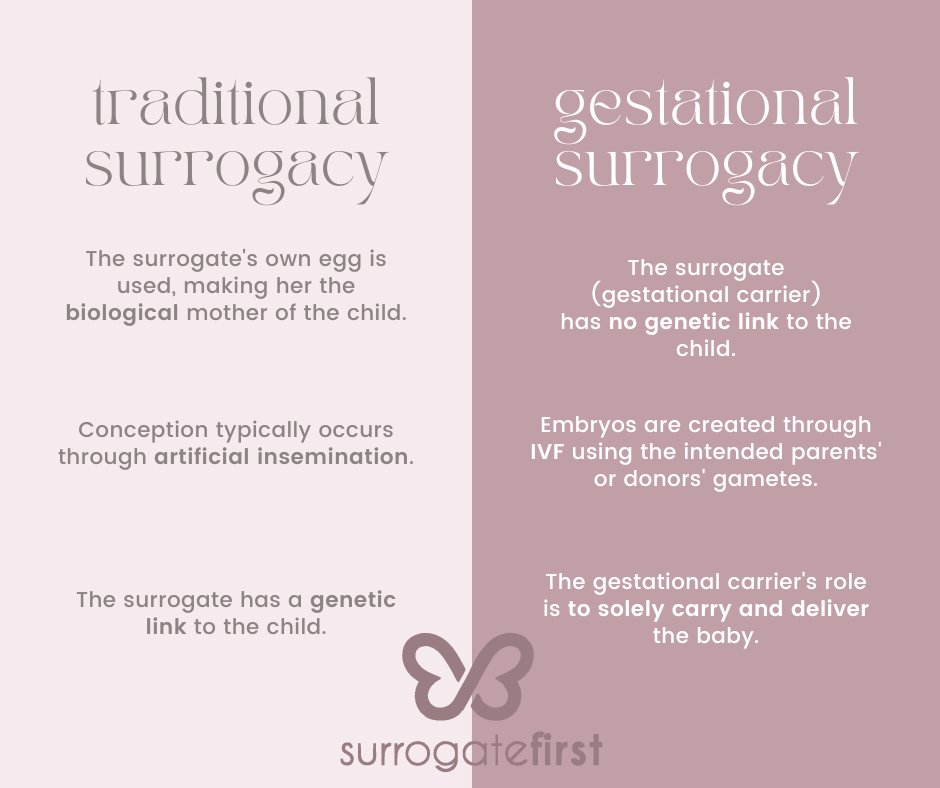In recent years, gestational surrogacy has emerged as an increasingly popular option for individuals and couples looking to build their families. This method of assisted reproduction offers hope to those who may struggle with infertility, same-sex couples, and others who cannot carry a pregnancy themselves. In this comprehensive guide, we’ll explore the whole process, how it works, and the key considerations for anyone considering this path to parenthood.

What is Gestational Surrogacy?
This type of surrogacy is a form of assisted reproduction where a woman, known as a gestational carrier, carries and delivers a baby for another person or couple, referred to as the intended parents. The crucial aspect of gestational surrogacy is that the gestational carrier has no genetic connection to the child she carries.
Unlike traditional surrogacy, here the embryo is created through in vitro fertilization (IVF) using the eggs and sperm of the intended parents or donors. This embryo is then transferred to the uterus of the gestational carrier, who carries the pregnancy to term and gives birth to the child.
Key participants in a gestational surrogacy arrangement include:
- Intended parents: The individual(s) who will become the legal parents of the child born through surrogacy.
- Gestational carrier: The woman who carries and gives birth to the child.
- Fertility clinic and medical professionals: They handle the medical aspects of the process, including IVF and embryo transfer.
- Surrogacy agency: An organization that helps coordinate the surrogacy process and matches intended parents with gestational carriers.
- Legal professionals: Attorneys specializing in reproductive law who ensure the legal rights of all parties are protected.
Traditional vs. Gestational Surrogacy: Understanding the Difference
To fully grasp the concept of gestational surrogacy, it’s essential to understand how it differs from traditional surrogacy. Here’s a comparison of the two methods.

The key differences between these two methods lie in their legal and emotional implications. Gestational surrogacy is generally considered less legally complex and emotionally challenging for all parties involved, as the gestational carrier has no genetic connection to the child. This clarity in biological relationships has made gestational surrogacy the more prevalent and preferred method in modern surrogacy arrangements.
How Does Gestational Surrogacy Work?
The process involves several steps:
- Intended parents decide to pursue gestational surrogacy and may engage a surrogacy agency.
- A suitable gestational carrier is identified and matched with the intended parents.
- Both parties undergo medical and psychological screenings.
- Legal contracts are drafted and signed.
- The intended mother or an egg donor undergoes ovarian stimulation and egg retrieval.
- The eggs are fertilized with sperm from the intended father or a donor through IVF.
- The resulting embryo(s) are transferred to the gestational carrier’s uterus.
- If successful, the gestational carrier carries the pregnancy to term.
- The baby is born, and the intended parents assume legal parentage.

Benefits of Gestational Surrogacy
IVF surrogacy offers numerous benefits for both intended parents and gestational carriers:
For Intended Parents:
- Opportunity for a genetic connection to the child (if using their own gametes)
- Option for those unable to carry a pregnancy due to medical reasons or for same-sex male couples
- High success rates due to advancements in IVF technology
- Clearer legal framework compared to traditional surrogacy
For Gestational Carriers:
- Ability to help others create families
- Personal fulfillment and satisfaction
- Financial compensation
- No genetic link to the child, potentially reducing emotional complexity
Recent surveys have shown high levels of satisfaction among gestational carriers, with many reporting positive experiences and a sense of pride in helping others become parents.
Legal Considerations in Gestational Surrogacy
The legal landscape varies significantly by jurisdiction. Some states and countries have surrogacy-friendly laws, while others restrict or prohibit the practice. It’s crucial for all parties to work with experienced surrogacy attorneys to navigate these complex legal waters.
Key legal considerations include:
- Drafting and executing surrogacy contracts
- Establishing legal parentage for the intended parents
- Addressing insurance and medical decision-making during pregnancy
- Navigating cross-border surrogacy arrangements, if applicable
Recent personhood legislation in some areas has begun to impact the surrogacy landscape, making it even more critical to stay informed about current laws and work with knowledgeable professionals.

Gestational Surrogacy Requirements
Both intended parents and gestational carriers must meet certain requirements to participate in a surrogacy arrangement:
For Intended Parents:
- Medical screenings to ensure the ability to produce viable embryos
- Psychological evaluations to assess readiness for surrogacy
- Financial stability to cover surrogacy-related expenses
- Age considerations (varies by clinic and agency)
For Gestational Carriers:
- Good health and favorable medical history
- Previous successful pregnancies and childbirths
- Age restrictions (typically between 21-40 years old)
- Lifestyle requirements (non-smoking, limited alcohol consumption)
- Psychological screening to ensure emotional readiness
These requirements help ensure the best possible outcomes for all parties involved in the surrogacy journey.
Gestational Surrogacy Costs
The cost of gestational surrogacy can be significant, typically ranging from $100,000 to $150,000 or more in the United States. These expenses typically include:
- Medical costs (IVF, prenatal care, delivery)
- Legal fees
- Agency fees (if applicable)
- Surrogate compensation and benefits
- Insurance
- Miscellaneous expenses (travel, lost wages, etc.)
Given the substantial financial investment, many intended parents explore various financing options, including:
- Personal savings
- Fertility loans
- Grants and fundraising
- Insurance coverage (rare, but possible in some cases)
It’s important for intended parents to carefully plan and budget for all potential expenses associated with the whole process.
Gestational Surrogacy Compensation
Compensation for gestational carriers is an important aspect of the surrogacy arrangement. While exact amounts can vary, gestational carriers typically receive:
- Base compensation (average ranges from $30,000 to $60,000)
- Additional benefits and reimbursements, such as:
- Monthly allowances
- Maternity clothing allowance
- Lost wages coverage
- Childcare expenses
- Travel expenses
Compensation can vary based on factors such as the carrier’s experience, location, and the specific requirements of the surrogacy journey.
Conclusion
IVF surrogacy has revolutionized family-building options for many individuals and couples who might otherwise be unable to have children. By separating the genetic and gestational aspects of pregnancy, this method offers a unique opportunity for intended parents to have a biological connection to their child while engaging the help of a compassionate gestational carrier.
As with any complex medical and legal process, IVF surrogacy comes with its own set of challenges and considerations. It requires careful planning, emotional preparation, and significant financial investment. However, for many, the joy of welcoming a child through surrogacy far outweighs these challenges.
If you’re considering gestational surrogacy, it’s crucial to seek professional guidance from experienced fertility clinics, surrogacy agencies, and legal experts. Connecting with support groups or others who have gone through the process can also provide valuable insights and emotional support.
Ultimately, gestational surrogacy has opened doors for countless individuals and couples to experience the joys of parenthood. As medical technology continues to advance and legal frameworks evolve, gestational surrogacy will likely continue to play an important role in modern family-building.





